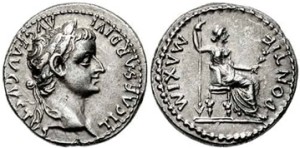Thoughts on Today’s Lessons for Oct. 19, 2014

A denarius of Tiberius Caesar, similar to the Roman coin that Jesus told the Pharisees to “give to the emperor.”
The people have survived the threat of a forgiving God’s destructive wrath. But now Moses worries that his troublesome flock might stray again. He asks God for assurance that God will continue to lead and guide the people. God agrees, but Moses wants more: He wants to see God in God’s glory. God warns that Moses dare not see God’s face. No human can see such glory and live. But a compromise emerges: Moses may stand in a crack in a rock, protected from danger, then open his eyes for a glimpse from behind after God passes by.
First Reading (Track Two): Isaiah 45:1-7
The people have been in exile in Babylon for 40 years, dreaming of their lost city and temple. Isaiah and the other prophets had warned them that they had no one but themselves to blame for their exile. They had failed to love their neighbor, forgotten to care for the weak and needy, and so broke the covenant with God that had brought them to the Promised Land. But now the Persians have conquered Babylon, led by the wise king that history knows as Cyrus the Great. Cyrus will send them home to Jerusalem. In celebration, the prophet praises the Gentile king as God’s own anointed.
Psalm: Psalm 99
The Psalmist celebrates this Exodus story, praising God for God’s justice and equity, remembering that God led the people in a pillar of cloud, answering the people’s prayers and, while justly punishing them when they strayed, forgave them in the end. Such a mighty God deserves praise and worship!
Psalm (Track 2): Psalm 96:1-13
Cyrus may have been a great king, but the Psalm quickly reminds us that God is king among all kings, before whom the whole Earth trembles. God created all things and will judge all things, fairly and with equity. Heaven and earth, thunder and lightning, all the fields and all the forest will rejoice when God comes to judge in righteousness and truth.
Second Reading: 1 Thessalonians 1:1-10
Paul praises this small community of former pagans in Thessalonika in Northern Greece, who had been persecuted for giving up the dominant religion. Their faith, Paul said, had inspired many converts, who were now waiting for Jesus to rescue them “from the wrath that is coming.” In this very early letter, written perhaps 20 years after the crucifixion, early Christians still hoped that Jesus would come back soon to judge the world and establish the kingdom of God on Earth.
Gospel: Matthew 22:15-22
This familiar story continues our recent narrative from Matthew: Jesus arrived in Jerusalem and quickly got in trouble, throwing the money changers out of the Temple. Now, in one encounter after another, he fences with the Pharisees who, in Matthew’s account, want to shut this trouble-maker down. They try to trap Jesus with a trick question, but he outwits them again, and in the process reveals that the temple leaders carry Caesar’s graven image on the coins in their purses. “Give to the emperor the things that are the emperor’s? How much do you suppose that might be? What then do we give to God?
